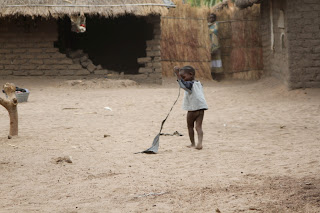 |
| Sarah watches other children play outside |
I recently learned in Zambia ( and I suspect elsewhere) if you don't breast feed your baby people will ask you why and suspect you have HIV/AIDS. The stigma is great and choosing not to expose your baby to HIV through breast feeding is therefor not really an option. Child survival continues to be significantly better in breast-fed infants in places where water sources are unclean and infectious diseases and malnutrition pose a significant risk of death.Yet breast-feeding contributes greatly to mother to child transmission. Strategies to reduce transmission include treating mothers and infants with ARV's during the period of breast feeding.





